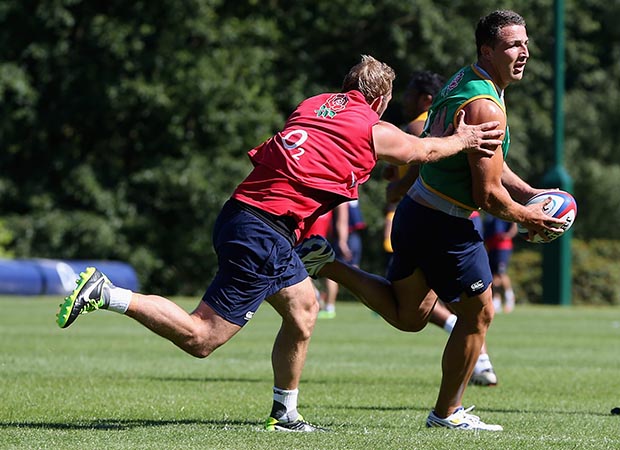 As we approach the Rugby World Cup and hear more and more details of how the teams are preparing, I have to ask, is all this hype overtaking reality?
As we approach the Rugby World Cup and hear more and more details of how the teams are preparing, I have to ask, is all this hype overtaking reality?
England's training in 33 degree heat (at their Pennyhill Park training camp) was reportedly pushing them to their limits as they prepare for the altitude of Colorado – but nothing could be further from the truth.
Recent research has actually found that altitude training is not all it's cracked up to be and that training in hot environments gives more of a long-term benefit. Researchers from the University of Oregon tracked the performance of 12 very high-level cyclists (ten male, two female) over a ten-day training period, with an appropriate rest break, in 100-degree Fahrenheit heat.
Another control group did the exact same exercise regime in a more comfortable, 55-degree heated room, both groups worked in 30 per cent humidity. Researchers discovered that the cyclists who worked through the heat improved their performance by seven per cent (a very noticeable and significant amount), while the control group did not show any improvement.
What surprised the researchers most was that the experimental group not only showed that they had achieved a level of heat acclimatisation, but the training also helped them to function better in a cooler environment. Study co-author Chris Minson, head of the human physiology department at the University of Oregon, says that heat acclimatisation training may overtake high altitude training in terms of an extreme way to achieve more elite fitness levels, since high altitude training forces the body to do everything at a slower pace.
Altitude can make an athlete fitter, but will hinder their speed, which could make a big difference in a game like rugby. Heat, on the other hand, has no such problem, so maybe Lancaster's squad would be better off going back to the Lanzarote heat as we did in 1991 instead of jetting off to the heights of Colorado. Fitness, it would seem, is the current byword for success. Yet, as anybody who's taken part in any physical activity at an elite level will tell you, it's important but only a very small part of what is needed for success in any endeavour.
The idea that just by getting fitter the England team will be able to run the opposition ragged, or play with the ball in hand for longer periods is far too simplistic, particularly as every other country will be attempting to peak in fitness at the same time.
There is also the fact that some of the Pacific Island nation players have a natural genetic fitness over Europeans, perhaps because they live and train constantly in the heat, so they could start the competition with an advantage in that area. The focus on fitness by all can only be to take attention from other more important areas of preparation, such as the technical set-piece plays in both attack and defence.
How England cope at the set-piece will define how well they can control the game and impose their game on the opposition. Traditional strengths in the English game are at the set-piece but changes in the game, particularly how it is refereed, have slowly reduced the ability of a team to win just by dominating the set-piece. However, trying to emulate the way the New Zealand team are perceived to play seems to me to be a recipe for disaster.
Many have hailed England's game against France in the Six Nations as the way forward and the way to play if we want to win the Cup – but although England scored 55, they leaked 35 against a French side that is having all sorts of problems. The game itself was not a proper game of rugby as both sides threw caution to the wind and with it the simple basics of the game. Defence it seems, was optional that day, as neither side sought to limit the other's wider ambitions.
If I had been either country's defence coach I would have resigned or at the very least made the squad do weeks of extra training in the basics of tackling.
One thing's for sure, if England played like that against Wales and Australia in the pool games, they won't get the chance to play New Zealand to find out if it would have worked against them.
Despite the popular belief that the All Blacks play ball in hand, throw it around everywhere, the truth is they have a very structured game that is based on simple principles. Namely, it is about control and field position and putting pressure on the opposition at breakdowns and kicking penalties. Once they have achieved points on the board they use a pressure defence, which forces the opposition into a kicking game. That then allows them to counter attack, which in broken play will give them more opportunity to score – but ultimately, the game is built around a solid defence that moves forward.
One area of England's preparations that puzzles me is the continuing inclusion of Sam Burgess in the squad, despite the constant assertions that he is not yet ready for an international call-up.
It maybe that given Tuilagi has forfeited his place in the squad, Lancaster is hoping that Burgess can fill a similar role. If so, then he should say so. At the moment it is as if Burgess is privileged to an opportunity that many other players would give their right arm for, a chance to train with the England World Cup squad all expenses paid by the RFU.
I have always said that Burgess could be a great player for England, once he has had time to learn the game and his position on the field is clarified. If Lancaster thinks that time is now, he should have the courage to say it and pick him as a true squad member, rather than a glorified training partner for the ‘real' squad members.



























